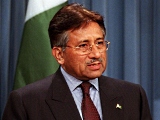Pakistan: Challenges after Musharraf
By Harsh V Pant for ISN
Hours before Pervez Musharraf decided to resign as president of Pakistan, his aides were insisting that he had no intention leaving his position. But the writing on the wall had been clear for some time: Musharraf had refused to read it.
The former general's fall was imminent the day he decided to give up his post as Army chief. On 18 August, nearly nine years after seizing power in a bloodless coup, Musharraf tearfully resigned to avoid the impeachment charges being prepared against him saying "Pakistan, Khuda Hafiz" (Pakistan, Good Bye) during a nationally televised speech.
It was a sad sight to see a man usually so confident of his eloquence lose his ability to articulate clearly.
Musharraf emerged as the toast of the international community when after the 11 September attacks he decided to lead Pakistan toward political reforms as well as tackle Islamist extremism emanating from his nation. It was bold move, and a risky one too. Had he been true to his promises he would have been hailed today as a real reformer.
Instead, as he found the political situation difficult to manage, he became more despotic, crushing the nation's democratic institutions under the might of his office. Not surprisingly, few are mourning his departure. A man who by his own reckoning built Pakistan by "taking an active interest in building infrastructure, strengthening teledensity of the country, leaving behind a vibrant media and fighting for Pakistan as a soldier" and made it clear that "had I kept myself above my country, I would have made some other announcement" found few supporters even as he decided to make his final move.
The Pakistani political establishment had emerged as Musharraf's main adversary early in his presidency. Public opinion and, in particular, the liberal elites who had initially supported Musharraf's reformist instincts, turned against him after the assault on the judiciary. The military had become uncomfortable with Musharraf's growing alienation from the Pakistani public as this made its own long-term position rather tenuous.
The US seemed to have also given up on Musharraf. President George W Bush, who considered Musharraf a close ally and a personal friend, realized that there was no possibility of saving Musharraf any longer. In many ways, the US got the worst of both worlds. It over-invested in the former general, who had failed to deliver on his promises even as US support for a despotic ruler made the country unpopular in the streets of Pakistan.
That the domestic scene had turned against him was not news for Musharraf, but once he realized that he was no longer viewed as an asset in the US' war against terror, there was no option but to leave as gracefully as he could. In that, he did receive help from the Bush administration, which apparently worked behind the scenes to negotiate Musharraf's safe exit, including indemnity from penalization and secure stay in a place of his choosing.
After putting all its eggs in Musharraf's basket for nine years, the US has to now work hard to re-establish ties with the Pakistani political establishment. This will be a difficult task, as the US is increasingly becoming frustrated with the Pakistani military and intelligence agencies.
Additionally, the new Pakistani government has yet to demonstrate much interest in tackling the Taliban and al-Qaida in the border areas, much to the chagrin of Washington, as sections of Pakistani military and intelligence remain sympathetic to the Taliban. Just recently, the US issued a warning that al-Qaida had "strengthened its safe haven in Pakistan's Federally Administered Tribal Area by deepening its alliances with Pakistani militants," and claimed it "now has many of the operational and organizational advantages it once enjoyed across the border in Afghanistan, albeit on a smaller and less secure scale." The Taliban are now moving into the country's interior areas, posing a threat to the very survival of Pakistan.
The governing coalition in Islamabad remains shaky. The hatred for Musharraf was perhaps the only glue that kept the coalition partners together: With Musharraf gone, the real test for Pakistan's democracy begins now.
The Army might be tempted to reclaim its pivotal position in Pakistani polity once again as the competition between the Pakistan Muslim League (N) and the Pakistan People's Party begins. Already the two parties are having serious disagreements on the restoration of the chief justice of the Supreme Court. The rupture in the coalition appears near.
The peaceful departure of Musharraf represents a consolidation of constitutional democracy in Pakistan, but the country's challenges – economic collapse, growing sectarian divide, loss of state control over vast swathe of its territory – are huge. If these problems are not tackled soon, disillusionment with the civilian politicians will begin anew.

